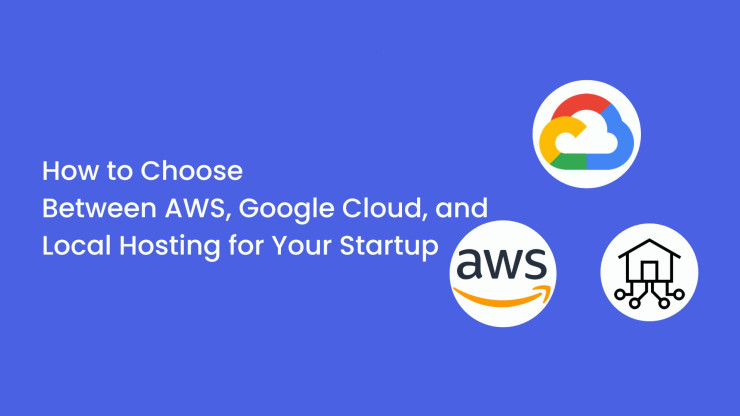
Cloud Confusion? You’re Not Alone
If you're launching a startup in Bangladesh, you're probably asking an important question:
Should I host on AWS, Google Cloud Platform (GCP), or stick with a local hosting provider?
With so many choices and tech terms, it’s easy to get overwhelmed. AWS, GCP, and local hosting all offer unique advantages, and your decision could directly affect your website’s performance, scalability, cost, and long-term growth.
This article will help you clearly understand your options and make the right decision—whether you’re building a new tech product, a service-based website, or an app.
Cloud vs. Local Hosting: What’s the Real Difference?
Before we dive into AWS vs. GCP, it’s helpful to understand what local hosting really means.
Local hosting refers to hosting services provided by companies in Bangladesh or nearby regions such as India or Singapore. These typically offer shared, VPS, or dedicated hosting for a flat monthly rate.
Cloud hosting, on the other hand, is provided by global giants like AWS (Amazon Web Services) and Google Cloud (GCP). They offer pay-as-you-go pricing, scalable infrastructure, and advanced tools for developers and businesses.
Local Hosting:
Lower cost
Simpler setup
Great for small, local websites
Cloud Hosting:
Global scalability
High performance and security
Ideal for growing startups, web apps, and services
AWS vs. GCP: Comparing the Two Cloud Giants
Both AWS and GCP offer world-class services, but each comes with its strengths and weaknesses.
Amazon Web Services (AWS)
AWS is the market leader in cloud computing. It offers a wide range of services including compute power, storage, networking, databases, and more. It’s a popular choice for businesses that want maximum flexibility and power.
Advantages:
Widely used by major global companies like Netflix, Airbnb, and NASA
Huge range of services and tools
Reliable infrastructure in multiple regions
Disadvantages:
Complex pricing structure
Steeper learning curve, especially for beginners
AWS is highly scalable and ideal for applications that need strong back-end support, such as e-commerce platforms or SaaS solutions.
Google Cloud Platform (GCP)
GCP is Google’s cloud offering and is well known for its simplicity, powerful data analytics tools, and integration with Google's services.
Advantages:
User-friendly interface
Strong capabilities in AI, machine learning, and Big Data
Seamless integration with Gmail, Google Drive, Firebase, and more
Often more cost-effective for startups
Disadvantages:
Smaller market share than AWS
Slightly fewer third-party integrations
GCP is often the better choice for data-driven startups or businesses looking for clean, intuitive cloud infrastructure.
Who Uses What?
Netflix uses AWS, not GCP. In contrast, companies like Spotify and Snapchat run on GCP due to its strength in real-time analytics and global network.
When to Choose Local Hosting
Not every startup needs the power of cloud platforms. If your business is small and your audience is primarily in Bangladesh, local hosting can be a smart and cost-effective choice.
Local Hosting is Ideal If:
You are launching a basic website or blog
Your primary users are in Bangladesh
You want fast load speeds without global reach
You are working with a limited budget
However, local hosting can become a limitation if you plan to scale up or serve a global audience in the future.
How Location Affects Speed and Performance
Hosting location directly affects your website’s performance. If your website is hosted in Dhaka and your users are also in Bangladesh, pages will load faster due to low latency.
If you expect users from different parts of the world, cloud platforms like AWS and GCP offer global content delivery networks (CDNs) to ensure fast performance everywhere.
Some local hosting providers also use data centers in nearby regions like Singapore or India, which can offer a balance between local and global performance.
Cost Considerations
For many startups, cost is a deciding factor. Here’s how pricing generally breaks down:
Local Hosting: Fixed monthly fee between ৳300 and ৳2,000 for basic plans
AWS & GCP: Pay-as-you-go pricing with generous free tiers for low usage
Both AWS and GCP offer free trials and free-tier services. For example, AWS offers 750 hours/month of EC2 for one year, and GCP provides $300 in free credits for new users.
Startups with predictable workloads and limited traffic may find local hosting more economical. However, cloud platforms are better for unpredictable traffic or scalable applications.
Practical Startup Scenarios
To help decide, consider these practical examples:
1. You’re launching a simple business site in Bangladesh
Use local hosting. It’s fast, cheap, and easy to manage.
2. You’re building a mobile app or web service that needs real-time updates and Firebase support
Choose GCP. Its integration with Firebase and real-time database tools is ideal.
3. You’re developing an e-commerce platform expecting future traffic growth
Choose AWS. It offers advanced tools like auto-scaling and load balancing to handle spikes in traffic.
Scalability and Growth Potential
If your goal is to grow quickly or expand globally, cloud platforms offer a major advantage.
With AWS or GCP, you can start small and scale without migrating your data. Cloud services can automatically adjust resources based on user demand. Local hosting, while reliable for small projects, often requires manual upgrades and lacks automation.
Security and Reliability
Security is a top concern for any business online. AWS and GCP offer enterprise-grade security features such as:
Data encryption
Regular backups
Identity and access management
DDoS protection
While some local hosting providers also offer good security, they generally can’t match the depth or automation of AWS or GCP.
Final Considerations
To make the right decision for your startup, ask the following:
Is your audience local or global?
Do you expect traffic to grow quickly?
Do you have the technical skill to manage a cloud platform?
What is your initial budget?
Will you use advanced services like AI, machine learning, or real-time databases?
Conclusion
Choosing between AWS, Google Cloud, and local hosting depends on your startup’s needs, budget, and future plans.
Choose local hosting if you’re launching a basic website and want to minimize costs.
Choose GCP if your startup is data-focused, AI-driven, or relies on real-time communication tools.
Choose AWS if you need robust cloud tools, expect high traffic, and want long-term scalability.
At Troubleshoot Limited, we’ve helped startups all across Bangladesh choose the right hosting path—whether that’s a local provider or a full cloud migration. If you’re unsure which option is best, we’re here to guide you.










Post Your Comments